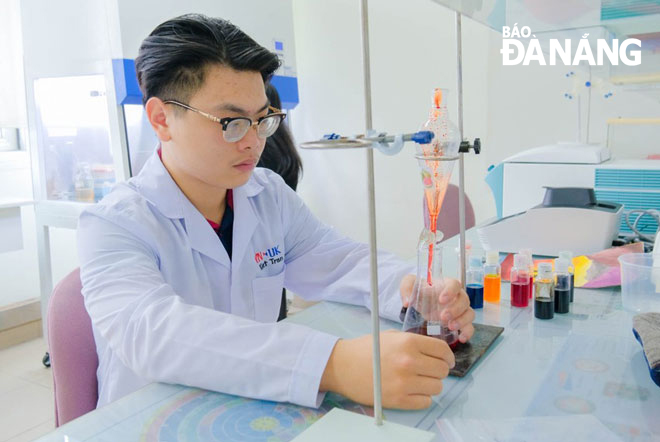Da Nang students create drawing inks from leftover fruit and vegetables
Wishing to create environmentally-friendly writing ink and art paints, the Binks group, the VN-UK Institute For Research and Executive Education, a member school of the University of Da Nang, has successfully researched the project ‘Botanical Inks’ made from leftover fruit and vegetables.
 |
| Student Tran Nhan Kiet, the head of the Binks team, is researching paint and ink products in the laboratory of the VN-UK Institute for Research and Executive Education. Photo: H.V |
The project won third prize at the ‘Innovation Challenge 2024’ competition and represented the UD in the final round of the ‘VSTARTUP 2024 Student Startup’ competition organised by the Vietnamese Ministry of Education and Training.
The team leader Tran Nhan Kiet, a second year student in Biomedical Science, said that the project researches and applies the colour change process of Anthocyanin compounds obtained from agricultural waste such as fruit and vegetable leftovers to produce writing ink and art paints without using any toxic chemicals.
The idea originates from the fact that every day at markets or supermarkets, tonnes of vegetables, tubers, and fruits are thrown away, causing a huge waste. This reality prompts the group to come up with a plan to take advantage of available raw materials to create writing ink and art paint products of natural origin, environmentally-friendly stature to ensure the health of users.
“During the project implementation process, the team encountered many difficulties with countless tests and adjusted parameters such as temperature and pH. However, with the already-set goal, the team is happy when vegetable ink products are being used and highly appreciated for their quality by two large drawing classes in the city.”, Kiet said happily.
Another group member, Nguyen Hoang Thanh Tram, a second-year student from Computer Science, said that to create vegetable ink products, the group took samples containing Anthocyanin from fruit and vegetables and then used appropriate solvents such as Methanol or Ethanol to extract Anthocyanins from the sample. Writing ink and paints obtained from Anthocyanin compounds in fruit and vegetables are not only safe but also possess 3 times higher fading resistance and 6 times faster drying speed than other products on the market.
Student Le Van Minh Tuan, a third- year student in International Business Administration, a member of the research team, explained that in terms of technology, the process of producing writing ink and paint from Anthocyanin compounds found in fruit and vegetables. This is completely new and has never been applied in Viet Nam before. In addition, the project demonstrates creativity through the ability to diversify products to meet diverse needs.
The group is researching to develop printing inks and fabric dyes for potential markets in the printing and textile fields, in line with the trend of environmental protection.
According to Kiet, the creativity of the project ‘Botanical Inks’ is also reflected in product and brand development strategies. The group is positioning clean ink made from fruit and vegetables as a green and good-quality option to change the community’s perception and consumption behaviour in a more sustainable direction.
At the same time, the project was thoroughly researched and evaluated for quality and safety from the VN-UK research experts in biochemistry, molecular chemistry and applied chemistry and it also received many positive feedback about product quality from professional artists and young people passionate about art.
Assoc. Prof. Dr. Giang Thi Kim Lien, the Deputy Director of the VN-UK Institute for Research and Executive Education said that vegetable ink products exploiting organic waste sources are not new but the approach is very groundbreaking and highly creative. At the same time, the project takes advantage of leftover fruit and vegetable resources to produce products with high added value. This is a technological breakthrough compared to traditional products, bringing the advantage of environmental friendliness and surpassing competitors in quality indicators.
Reporting by HUYNH VU - Translating by A.THU